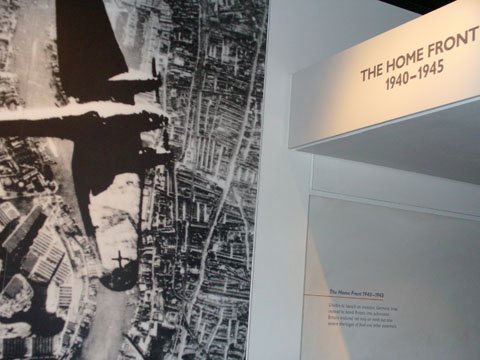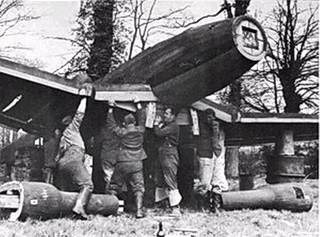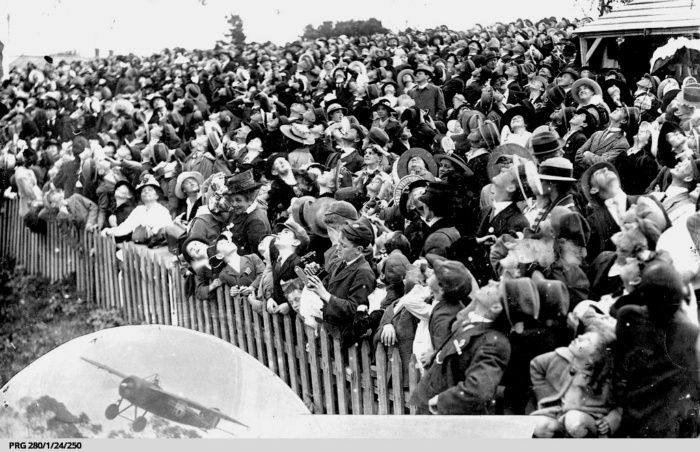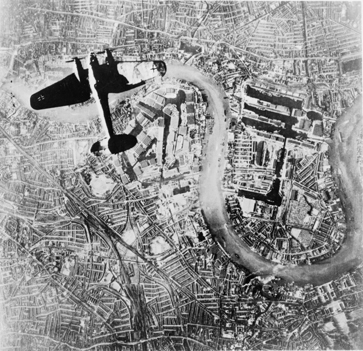One of my favourite posts here was one I wrote almost two years ago, about a claim that a certain well-known photo of the London Blitz was faked. Not only for the post itself, but for the ensuing discussion, which led me to change my mind on the issue more than once. My tentative conclusion is still that the photo is indeed a fake, and I’m not going to rehash that here. What I want to do here is show just how pervasive the image is.
When I was in London last year, I went to three museums where one would expect to find some sort of display about the Blitz: the RAF Museum, the Imperial War Museum, and the Cabinet War Rooms. Let’s see what images they each used to represent the Blitz …
RAF Museum:

Imperial War Museum:

Cabinet War Rooms:

That’s three for three!
And now, here’s the result of a trawl through my bookshelves (I’ve apparently killed my camera to take this shot, so enjoy it):

I found six books which used it. The earliest is Constantine FitzGibbons’ London’s Burning (1970), where it appears on the title page. The others are Stephen Bungay’s The Most Dangerous Enemy, Richard Hough and Denis Richard’s The Battle of Britain, John Keegan’s The Second World War, The Blitz: Then and Now (Vol. 2) and Peter Stansky’s The First Day of the Blitz.
Maybe this is a boringly literal way to look at it (as it were), but it seems to me that if the photo is a fake, then it shouldn’t be used to represent the Blitz in this way. I suppose what needs to happen is research: from the British side, somebody needs to compare the image with known aerial photos of the same area from ca. September 1940, and/or from the German side, somebody needs dig into the origins of the photo. And then the word needs to be gotten out somehow …
![]() This work is licensed under a Creative Commons Attribution-NonCommercial-NoDerivatives 4.0 International License.
Permissions beyond the scope of this license may be available at http://airminded.org/copyright/.
This work is licensed under a Creative Commons Attribution-NonCommercial-NoDerivatives 4.0 International License.
Permissions beyond the scope of this license may be available at http://airminded.org/copyright/.






Strewth Brett, reading that original post and discussion reminds me of the obsessive crazy weirdness concerning Obama’s birth certificate:
http://atlasshrugs2000.typepad.com/atlas_shrugs/2008/07/atlas-exclusive.html
Are you sure you’re not on someone’s death-list?
I was at the IWM Photographic Archive in July, but I never thought to ask about this. Ah well.
I wonder how far back the commercial use of the photo can be traced?
CK:
I hope you’re not suggesting that I’m a Randian! *shudder*
Nah, sometimes it’s just fun to take some really trivial question and worry it to death.
Alan:
I did think of it when I was there last year (manuscripts, not photos though) but I was only there for a day and decided I had more important things to look at!
Well, if it is actually a German propaganda fake, then odds-on it originally appeared in Der Adler or somewhere like that :)
Although they’re not necessarily able/willing to give precise usage information, it might be worth contacting the IWM photo archive and asking them either how many requests they get for this one, or which photos they give out in response to generic requests for Blitz images. Once a photo is logged in the collective psyche as signifying ‘Blitz’ (or ‘trenches’) it’s very hard to shift.
I guess I’m more interested in any information the IWM could provide as to the provenance of the image, but I agree that it’ll be hard to stop the image from signifying the Blitz. It’s probably not even such a bad thing that it does … it is a very cool, er, I mean striking image after all …
This photograph (German bomber over London) also appears in a textbook, “Counterpoints”, widely used in British Columbia, Canada, as a resource for teaching the history component of the Grade 11 (high school) Social Studies curriculum. Is there any new information about the photo’s authenticity? I am considering notifying the textbook’s publisher about this controversy, but I’d like to have my facts straight first. Thank you for your help.
Sorry, unfortunately everything I know (or rather don’t know) about this is in the two posts …
Thank you for your response, Mr. (Dr.?) Holman.
Not yet Dr!